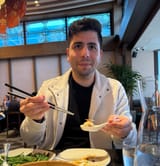The fight for Indigenous rights = the fight against fascism
Resistance against fascism in the US has been ongoing since 1776—learn from those who have been fighting fascist bullshit this whole time.
I don't know much about Native American resistance against white supremacy. I know some things about the history of that struggle—but those few things which I’ve understood logically, I’ve never understood emotionally.
Like many Americans, I've spent much of my life intellectually and spiritually stunted by colonial myth and the allure of individualism. When I was growing up, my empathy toward the Native cause was heavily influenced by whether it felt relevant to my daily life—and often, it didn’t. I’m not proud of this, but it’s important to recognize it so I can unlearn that self-centered framing.
Today’s rising fascism has led me to assess history through a less selfish lens. Ironically, while I’ve been working to de-center myself in my understanding of the world, this interview with Leonard Peltier has made it abundantly clear that the topic of Native resistance actually is quite relevant to my daily life. It’s always been relevant — my life has always passively benefited from Native resistance.
That’s because—like struggles for women’s suffrage and those of the Civil Rights movement—the centuries-long fight for rightful Native sovereignty reinforces all other fights against fascism by pushing back against precedent-setting fascist overreach. Given the chance, fascists who target Indigenous people will also target me... and anyone else who doesn’t fit cleanly into their fascist mythos. This means that the Native cause has been shielding me from fascists my entire life.
Through various books and video essays, I’ve been learning about some of the many courageous activists whom the State has punished for their resistance to injustice. So many elements of Peltier’s story parallel the experiences of other activists. As I learn more of their stories, I’m realizing that the State always seems to use the same violent means to suppress their dissent. These stories contain recurring themes.
It’s becoming clear that activist's fights for human rights are all connected, waged against a common enemy. Their enemy is the disproportionate power held by the ultra wealthy capitalist class which seeks to subjugate the human experience for profit. That 'ultra wealthy' part is pretty important of course—it allows those in power to proliferate white supremacist ideology for the purpose of dividing and conquering the working class.
All this shit is connected, and it's becoming more obvious every day as oligarchs and politicians brazenly flaunt their wealth and slash at social safety nets.
I encourage you to watch this interview firsthand. I learned history here that I knew basically nothing about—including details of the government’s formal push for assimilation and cultural destruction via Indian Termination policies.
Increasing my exposure to this history is helping me contextualize our current moment of 2025 Star-Spangled Domestic Fascism... I'm less scared when I understand these things as part of a bigger picture. I have more hope when I learn about the successes of activists like Peltier. The more I learn, the more I find myself genuinely hopeful about the future.
An important factor in my educational journey has been coming to terms with the fact that Israel is conducting a genocide of the Palestinian people in Gaza—and that as a tax paying American, I am being forced to fund it. During this interview, Peltier describes the ongoing genocide of Palestinians as mirroring what was done to Native people in the Americas. This seems obvious in retrospect, but hearing it from Peltier hit me hard. In Palestine, we see so clearly how all the global struggles for freedom are so connected.
We have shit to fight for in 2025... we have work to do. Many activists like Peltier have known this their entire lives, while normie people like myself are just starting to wake up to these realities. Peltier's interview helped me take another step in the right direction. Maybe it'll help you, too.
